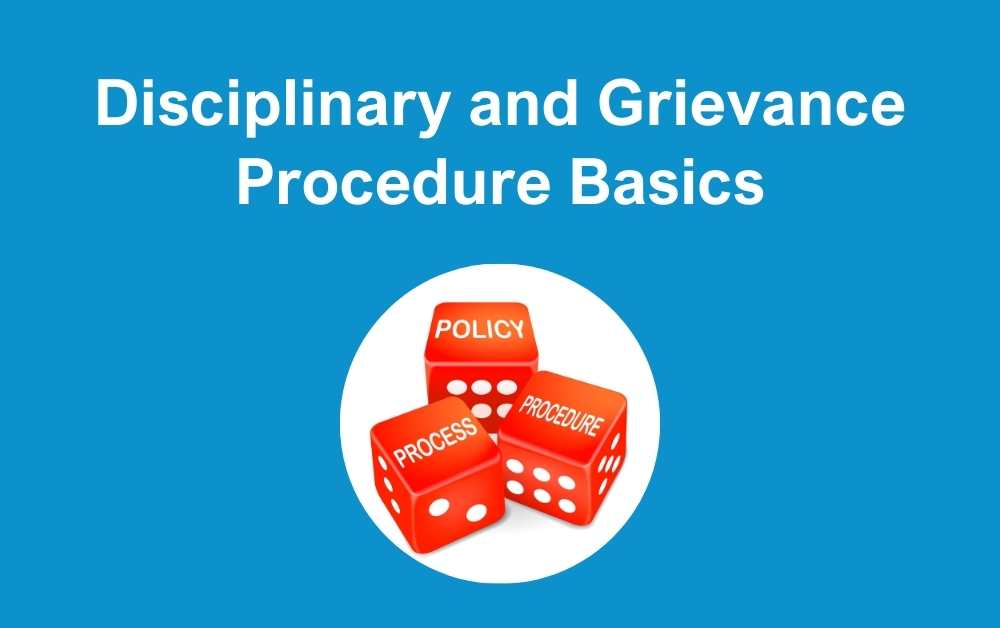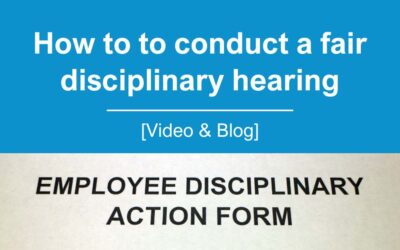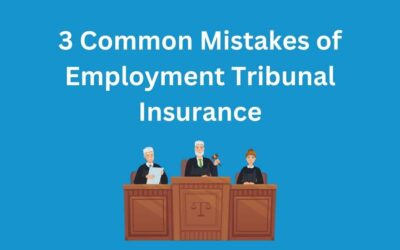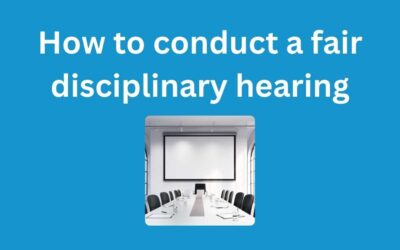Let’s examine the basics of Disciplinary and Grievance Procedure. Managing discipline and employee grievances in the workplace is vital. It teaches employees what is acceptable and what is not and allows you to reach resolutions that keep your organisation moving forward.
While every organisation will have their own disciplinary and grievance procedures, the same basics underlie these processes. In this article, we’ll discuss five of the most constructive principles you can adhere to to make your disciplinary and grievance procedures efficient, meaningful, and effective.
Investigate the underlying facts of the disciplinary issue
Before beginning any disciplinary processes, it’s important that you carry out necessary investigations to establish what happened when it happened, and what policies or other rules the employee has violated.
Sometimes, you may need to meet with the employee before progressing further in the process. In other cases, you may need to speak with other employees or collect physical evidence to establish what happened.
If the potential offence is particularly troublesome, you may want to suspend the employee with pay. You can’t necessarily withhold pay because you haven’t proven any wrongdoing. In any case, this should be kept as brief as possible so you can establish what happened and move forward with the disciplinary process.
Inform the Employee of the Issue
If your investigation results in a particular violation or grievance, you should notify the employee in writing. You should provide information as to what happened and the consequences you’re considering to keep the employee informed and updated on what to expect.
The written notice should also contain information regarding when and where the disciplinary hearing will be held.
Hold a Meeting to Discuss the Problem
You should hold this meeting as soon as is possible after your investigation and notify the employee. During this meeting, you will:
- Inform the employee of the complaint made against him or her;
- Allow the employee to make their case and respond to the allegations; and
- Allow the employee to ask questions and present witnesses as to what happened
You should always inform each employee of the meeting procedure so they have time to prepare witnesses or organise other information they need.
Allow the Employee to be Accompanied During the Meeting
By statute, employees have the right to be accompanied to a disciplinary meeting if the meeting may result in:
- A formal warning;
- A disciplinary action; or
- An appeal hearing or other confirmation hearing
Most companions are fellow workers, trade union representatives, or another official from a trade union. However, your employee must request to a companion to have one present at the meeting. Moreover, they must choose a companion whose presence doesn’t conflict with the topic of dispute.
Companions are allowed to participate in the meeting and speak with your employee. However, they may not answer questions on the employee’s behalf. Establishing strict rules will help the meeting move along efficiently and establish an appropriate resolution.
Decide on the Most Appropriate Action
The meeting will determine whether additional disciplinary action is appropriate. If you decide to act, you should inform the employee in writing.
Typically, a written warning is the first course of action for any discipline. This is true for most companies when the employee has violated a policy or otherwise committed wrongdoing for the first time. If the violation is particularly grievous, you may want to issue a final written warning rather than a first warning to deter future bad behaviour.
Some employees are subject to dismissal after their meeting. If this occurs, you must issue a written notice with the reason for dismissal and the date inactive from which it took effect and offer appropriate written notice. In some instances, employees also have the right to appeal, and you should detail the process or how employees can do so in the same letter.
Employee Tribunal
In the UK, employee tribunals are vital forums for resolving disputes between employers and employees. As you navigate this process, it’s crucial to understand its formalities and procedures. Tribunals handle various issues, such as unfair dismissal, discrimination, and contractual breaches. They provide a fair platform for presenting evidence and legal arguments. Remember, outcomes can impact both parties significantly, affecting finances and workplace dynamics. Whether you’re an employer or employee, seeking legal advice and preparing thoroughly is essential. By understanding the ins and outs of tribunals, you can navigate this process effectively and strive for a fair resolution.
Gross Misconduct
When it comes to workplace conduct, gross misconduct refers to serious breaches that are simply unacceptable. This can include theft, violence, harassment, or severe negligence. Such behaviour undermines the trust between you and your employer and may lead to immediate dismissal without notice or severance pay. Employers usually outline examples of gross misconduct in their disciplinary policies, ensuring clarity for all staff. It’s crucial for you to understand what actions constitute gross misconduct and the potential consequences. By upholding clear standards and taking swift action against such behaviour, employers can maintain a safe and productive work environment for everyone.
The difference between an unfair dismissal and a constructive dismissal
Unfair dismissal and constructive dismissal are critical issues in employment law that can greatly affect you as an employee. Unfair dismissal happens when your employer terminates your contract without a valid reason or fails to follow proper dismissal procedures. This might include being fired for reasons like discrimination, whistleblowing, or exercising your employment rights. On the other hand, constructive dismissal occurs when you resign because of a serious breach of your employment contract by your employer, such as harassment, demotion without cause, or significant changes in working conditions. In both cases, you may have legal recourse, seeking remedies like reinstatement, compensation, or damages. You must know your rights and seek legal advice if you believe you’ve been unfairly or constructively dismissed.
When to seek legal advice
When it comes to navigating legal matters, seeking advice from a qualified solicitor or lawyer is essential for ensuring that you fully understand your rights and options. Whether you’re dealing with a contractual dispute, an employment issue, or a personal injury claim, legal counsel provides expert guidance tailored to your specific circumstances. A solicitor or lawyer can offer clarity on complex legal issues, represent your interests in negotiations or court proceedings, and work towards achieving the best possible outcome for you. By investing in sound legal advice, you empower yourself to make informed decisions and effectively address any legal challenges that may arise.
What is a formal grievance?
When you have a complaint or concern about your work or treatment in the workplace, you can raise it formally through a grievance procedure. This provides a structured framework for addressing issues and seeking resolution.
What is a settlement agreement?
Also known as a compromise agreement, a settlement agreement is a legally binding contract between an employer and employee, usually used to resolve disputes or terminate employment on agreed terms.
Employee Complaints
You may raise complaints about various aspects of your employment, including working conditions, treatment by colleagues or management, or breaches of employment law.
What is a verbal warning and when to issue it?
A verbal warning is an informal disciplinary action, typically the first step in addressing performance or conduct issues. It serves as a formal notice to you that your behaviour or performance is not meeting expectations.
Performance management – what is involved?
Performance management involves monitoring, evaluating, and supporting you to ensure you meet your job requirements and contribute effectively to the organisation’s goals.
What is a grievance hearing?
A grievance hearing is a formal meeting where you can explain your concerns to management, and both parties can discuss potential resolutions.
What is a disciplinary policy, and do I need one?
The employee handbook outlines the organisation’s policies, procedures, and expectations for employees. The disciplinary policy sets out the procedures for addressing misconduct or poor performance.
What is age discrimination?
Discrimination occurs when you are treated unfairly or less favourably due to characteristics such as race, gender, disability, or age. Age discrimination specifically relates to treating you unfairly based on your age.
Grievance Outcome
Management will make a disciplinary decision regarding your conduct or performance after an investigation or hearing. Similarly, after a grievance process, an outcome will be reached regarding your complaint.
How to conduct a fair procedure?
Having clear procedures in place ensures that all parties are aware of their rights and responsibilities. A fair procedure requires employers to follow these procedures consistently and impartially, respecting the principles of natural justice.
Understanding these terms and processes is essential for you and your employer to effectively manage workplace disputes, uphold fairness, and ensure a positive working environment for all parties involved. By adhering to established procedures and principles, organisations can address issues promptly and transparently, fostering trust and accountability within the workplace.
Disciplinary procedures don’t have to be difficult
The disciplinary process is vital but doesn’t have to be as complicated as some organisations make it. The best practice for controlling your program is to focus on efficiency, clarity, and fairness. Doing so will allow you to resolve disputes quickly and keep employees on track for the future.
If you’re struggling to implement an effective disciplinary procedure in the workplace, The HR Booth can help. We have decades of combined experience in countless HR fields and can structure a procedure that makes sense for your organisation.






